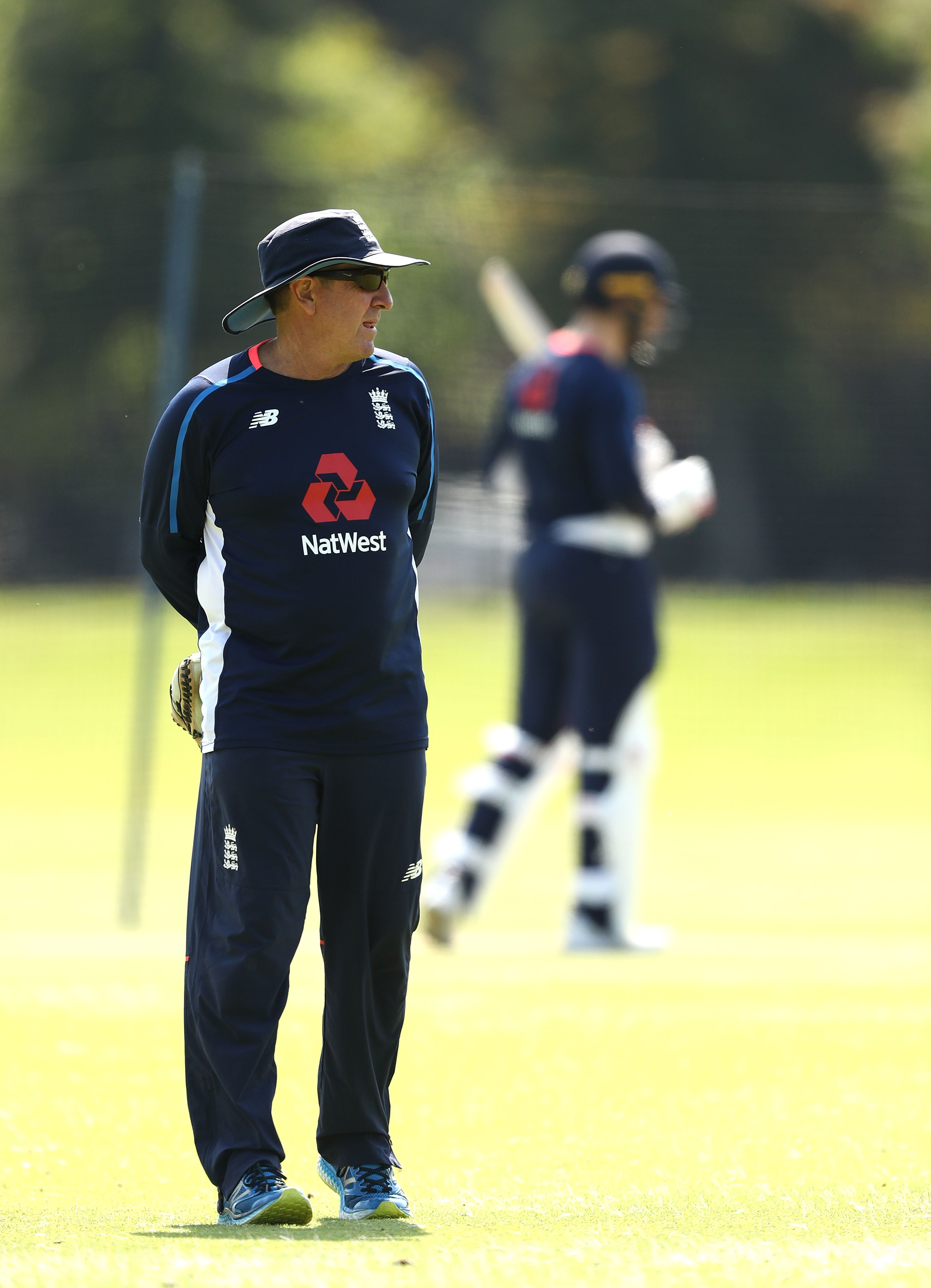Trevor Bayliss era- Of outstanding man management and a last standing loophole in England Cricket
England’s departing coach Trevor Bayliss was referred to as a scented candle by a regular scribe of which he was aware but he did not make a fuss about it at all. For he’s as calm as snowfall and has the warmth of an “elder brother” and that explains the unparalleled legacy he’s leaving behind.

Four years ago, England had returned from a devastatingly disappointing stint in the World Cup down under. The English team was in desperate need of stability, discipline and a miracle to resurrect their perished ODI form. Andrew Strauss and captain Eoin Morgan, together, had their eyes set on the next World Cup, the one in 2019 at home. And that’s what made Trevor Bayliss, most recently a former coach of the England cricket team, Strauss’ top choice.
An incredible CV
A man of few words, Bayliss had an incredible quality; when he did speak, people listened. Moreover, the résumé he came with gave him more credibility than most coaches in the past. He had taken Sri Lanka to a World Cup final and a World T20 victory. His association with the Kolkata Knight Riders led to two IPL titles in 2012 and 2014. He also lifted the Big Bash League and the now-defunct Champions League T20 with Sydney Sixers.
The feeling that England’s short-form cricket style needed to change drove Strauss as he gave Morgan and Bayliss his full backing and freedom to make the necessary changes to remodel the team into the best ODI side the best in the world. Bayliss recommended his trusted lieutenant Paul Farbrace be appointed as well. A new journey had begun.
As Strauss on his appointment said, "His expertise in the shorter forms of the game will be vital as we build towards three major ICC events over the next four years; the World T20 in India in 2016 and the Champions Trophy and World Cup which will be staged in England and Wales in 2017 and 2019 respectively."
Legacy
The World Cup dream was materialized on July 14 this year, with the Lord’s as witness.
Stringing that to the final day of Ashes 2019 at The Oval, it was indeed a perfect accolade on the legacy of Trevor Bayliss, who stepped down as England coach after the game. Clearly, he isn’t leaving with conflicts with anyone in English Cricket, in fact, his four-year tenure had seen no recriminations of any sort. In fact, Kevin Pietersen once indicated that had Bayliss been the coach during all his tensions with Strauss, he could’ve managed the situation better than anyone else. If we look back at the coaches who served before him, the successful ones like Duncan Fletcher and Andy Flower, they all left the throne with mutual disputes or a foreboding of one. Instead, Bayliss left with a scented candle from the press (literally!) and an undying admiration from his players and associates.
“England may well miss him when he's gone. Well, who doesn't like a scented candle?”, a regular scribe had made a sally in late 2018, rowing back from his own statement from a year before. The man being referred to as a scented candle was aware by all means but he did not make a fuss about it. That’s something inherent in him, he doesn’t make a fuss about anything. He’s as calm as snowfall and has the warmth of an “elder brother”, as Indian cricketer Manoj Tiwary, speaking exclusively to Sportscafe, admirably puts it.
Man management and communication
Much before his World Cup glory for England, Bayliss as head coach had taken the Kolkata Knight Riders to not one but two IPL victories, in 2012 and 2014. Manoj Tiwary feels he was fortunate enough to be a part of the first time KKR experienced lifting the title. And then there was Bayliss, hung back, feeling proud of his players as he always is. “He never quite liked the limelight”, Tiwary points it out for us. “He's a very quiet guy, he hangs back. He doesn't want to come in front, like, that's his nature. He wants the limelight to be on or not on the players and meanwhile, behind the scenes, he does his own things quietly.”
There was a massive celebration all around the Lord’s ground when England, aided by the heroics of Ben Stokes, bettered the New Zealand team to win the 50-over World Cup for the first time. The camaraderie of the team looked better than most of the English teams in the past. Perhaps, this mutual gratitude was a result of Bayliss’ efforts. But did you see him running to the ground to celebrate with the team? He probably laidback and smiled in pride and joy and that’s about it.

 Bayliss consoles Stokes on the night of the WT20 2016 final ©
Bayliss consoles Stokes on the night of the WT20 2016 final © However, Bayliss was there right in the ‘limelight’ when Ben Stokes was on his knees and in tears at the Eden Gardens in the final of WT20 2016. Bayliss held the bowler who had just been smashed for four sixes in a row when West Indies required 19 runs off the final over. That was indeed the lowest point of Stokes’ incredible career and Bayliss had held him tight. From that day to the present- when the all-rounder is in fact a star for England in all three formats - Stokes’ evolution has been huge. After the WT20 debacle, the fight in Bristol nearly cost Stokes his career as he missed high profile series including an Ashes down under.
But fortunately, Bayliss was able to handle and talk Stokes through all the lows of his career. Stokes was able to reintegrate, refocus and return to becoming one of the best all-rounders in the world. To quote Mark Wood from an earlier interview with the BBC, “Trev and Stokesy have gone on to develop a relationship of mutual respect. Stokesy has kept up the Aussie accent, while I think Trev loves the way Stokesy plays, never taking a backward step. ‘Keep your foot on the throat,’ as Trev would say.”
“There is a perception that he doesn't do much for the team. That couldn't be further from truth,” Wood added.
The last loophole standing
Bayliss’ tenure as head coach was a representation of an era of an unusually unorthodox model of Cricket in the English set-up. The ECB has always boasted about Test cricket being their priority. But the past four years have seen something different. The ODI record was incredible with 62 wins in 93 matches, whereas, in Test Cricket the Win/Loss ratio dropped to 1.07. While the 300+ scores in the 50-over format had skyrocketing progress, the number of 400+ totals in Tests took a significant dip. Also, England were bowled out under a total of 100 four times in the period, whereas if we look at a span of four years before Bayliss, that count was only one.
Test cricket has been losing its priority with the County Championship being pushed into the margins of the season and more numbers of T20 fixtures emerging at the expense of first-class cricket. In fact, an expert in the LOIs, Bayliss failed to translate that in the longest format. The impact he had on Stokes helped shaped his career but at some point the coach needs to help the players with their technique too. Not that Bayliss didn’t, but he never quite emphasized on it. In fact, he didn’t believe in schooling players about their technique. Only when England played a shockingly bad innings, someone like a Michael Vaughan would brutally point out what the problem is and that’s when the players were urged to improve their game.
If we look beyond Ben Stokes and Rory Burns, the Ashes was but an example of where the England batting horrendously failed with the same old problem with Joe Root’s technique coming to the forefront. The England captain failed to convert all of his four half-centuries into a ton. This isn’t an instance of Bayliss missing the catch, this is a catch that the coach didn’t even attempt. And that’s where the major hole lies. While England will struggle to find a man manager like him, they’ll have to work harder on the topics Bayliss never touched.

Comments
Sign up or log in to your account to leave comments and reactions
0 Comments